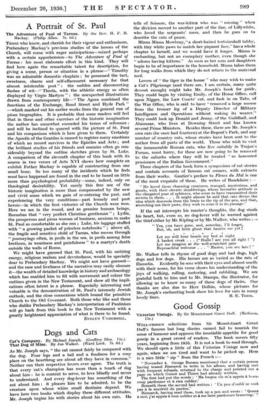A Portrait of St. Paul
The Adventure of Paul of Tarsus. By the Rev. H. F. B. Mackay. (Philip Allan. 7s. Oil.) TliosE who know, and cherish for their vigour and enthusiasm, Prebendary Mackay's previous studies of the heroes of the Church, will come with eager anticipations—mixed perhaps with a certain apprehension—to The Adventure of Paul of Tarsus : his most elaborate effort in this kind. They will find here again the remarkable talent for description, for giving a scene, person or situation in a phrase—" Timothy was an admirable domestic chaplain ; he possessed the tact, sweetness, charm and self-effacement necessary for that almost intolerable post" : the sudden and disconcerting flashes of wit—" Thecla, with the athletic energy so often displayed by Virgin Martyrs " : the unexpected illustrations drawn from contemporary life—" The Agora combined the functions of the Exchange, Bond Street and Hyde Park " —which marked out his earlier works from the general run of pious biographies. It is probable that some readers will feel that in these and other exercises of the historic imagination the author has somewhat exceeded his terms of reference : and will be inclined to quarrel with the picture of St. Paul and his companions which is here given to them. 'Certainly the Apostle of the Gentiles is caused to register many emotions of which no record survives in the Epistles and Acts ; and the brilliant studies of his friends and enemies often go con- siderably beyond the outline sketches given by St. Luke. A comparison of the eleventh chapter of this book with its source in two verses of Acts XVI shows how complete an exhibit Father Mackay is capable of constructing from one small bone. So too many of the incidents which he feels must have happened are found in the end to be based on little more than psychological probability—some, indeed, only on theological desirability. Yet surely this free use of the historic imagination is more than compensated by the new and vivid sense which we gain of re-entering the past, and experiencing the very conditions—part homely and part heroic—in which the first victories of the Church were won. Here we see in the round, and as genuine human beings, Bamabas that " very perfect Christian gentleman " ; Lydia, the prosperous and pious woman of business, anxious to make St. Paul as comfortable as she can ; Luke, his luggage stuffed with " a growing packet of priceless notebooks " ; above all, the fragile and sensitive child of Tarsus, who moves through " journeyings often, in perils in the sea, in perils among false brethren, in weariness and painfulness " to a martyr's death outside the walls of Rome.
We might have guessed that St. Paul, with his untiring energy, religious realism and devotedness, would be specially dear to Prebendary Mackay. We might not have guessed— and the ease and liveliness of the narrative may easily obscure it—the wealth of detailed knowledge in history and archaeology which has enabled him to fill with movement and colour the outlines given in the New Testament, and show all the impli- cations often latent in a phrase. Especially interesting and valuable is the demonstration of St. Paul's intensely Jewish outlook, and the close connexions which bound the primitive Church to the Old Covenant. Both those who like and those who dislike Prebendary Mackay's interpretation of Paulinism will go back from this book to the New Testament with a greatly heightened appreciation of what is there to be found.
EVELYN UNDERHILL.






































 Previous page
Previous page